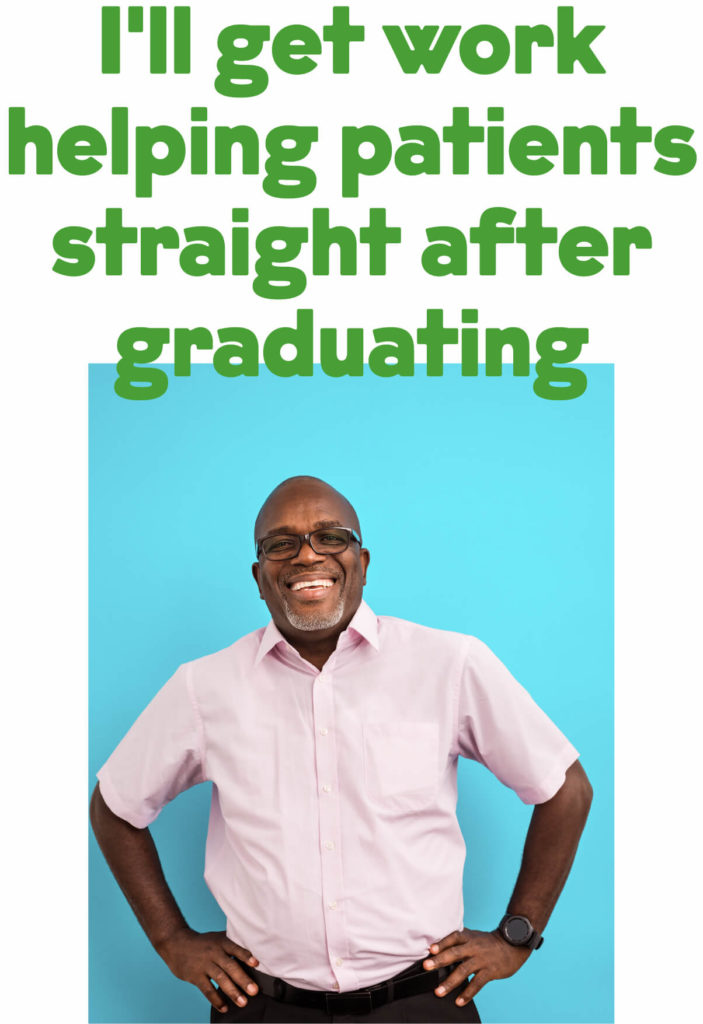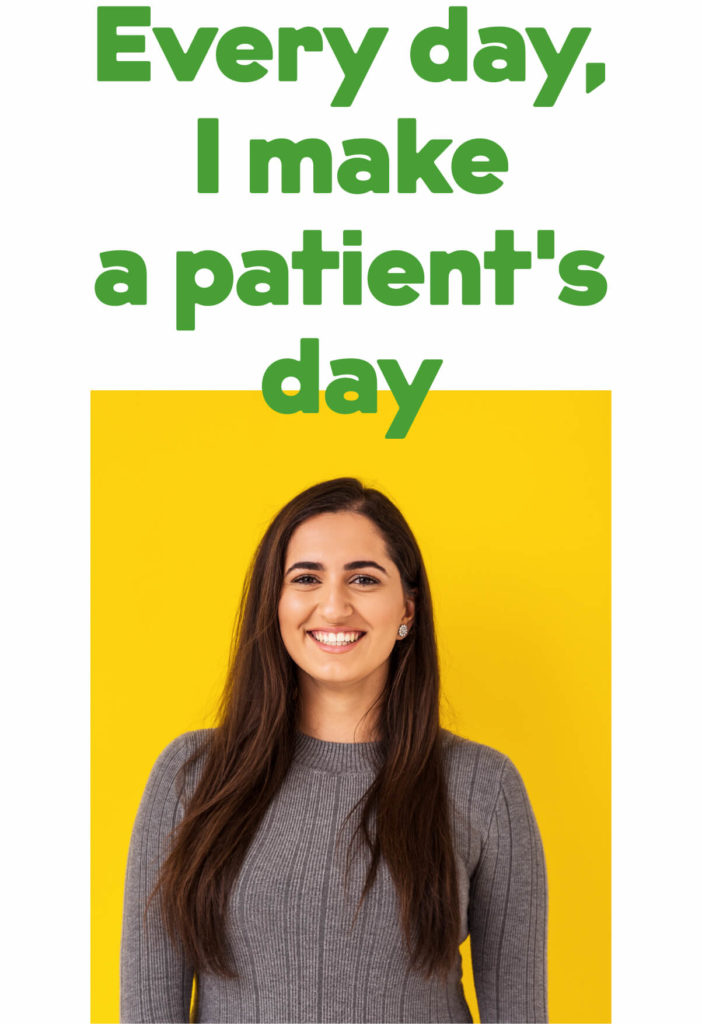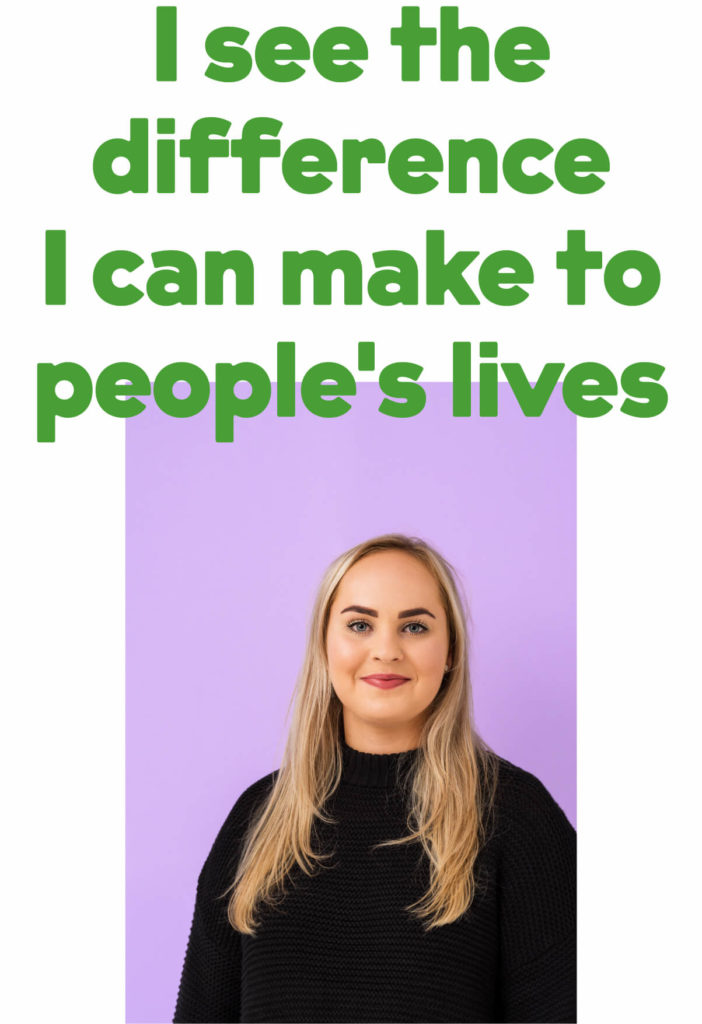The allied health professions are a family of specialist roles who use their knowledge and skills to help patients live the fullest lives possible. They work directly with patients, so they can see the difference they make every day.
Studying to become an allied health professional is very hands-on. You’ll help real patients as you earn your degree, and graduate ready to start a fulfilling career.
Art therapist→
What does an art therapist do?
An art therapist uses art to help people communicate and address a range of issues.
A patient might see an art therapist if it’s difficult for them to communicate in a straightforward way – perhaps because of an emotional, behavioural or mental health problem, a learning or physical disability, a neurological condition or a physical illness.
What’s the work like?
- You could help people of all ages, either one-to-one or in group sessions.
- As you continue your career in art therapy, you’ll have the opportunity to specialise in areas that interest you. You could specialise in a particular issue, like dementia, mental health or palliative care; a specific kind of client, such as children, elderly people or offenders; or a particular therapy technique, such as cognitive behavioural therapy.
- Experienced art therapists can take on senior or consultant roles, managing a team of art therapists, music therapists and dramatherapists.
- Art therapists can work in the NHS or in a variety of other places, including social services, education and probation. They can combine employed and selfemployed work.
Diagnostic radiographer→
What does a diagnostic radiographer do?
A diagnostic radiographer uses the latest technology to look inside people’s bodies and work out what is causing their illnesses.
Diagnostic radiographers can work with a huge variety of patients and conditions every day. They use x-rays to look at bones and foreign objects inside the body, fluoroscopy to livestream from inside the digestive system, and angiography to investigate inside veins and arteries, among many more techniques.
What's the work like?
- Diagnostic radiographers provide a service for other hospital departments. As well as the other members of your team, like support workers and assistant practitioners, you’ll have contact with professionals from accident and emergency departments, wards, operating theatres and more.
- As you continue your career in diagnostic radiography, you’ll have the opportunity to specialise in areas that interest you. That could mean working more closely with specific technologies, specialising in particular conditions, or working to develop the next generation of imaging technology.
- Most radiographers work in the NHS, but some work in private hospitals or clinics, or teach in universities.
Dietitian→
What does a dietitian do?
A dietitian helps people make informed and practical choices about food, based on the science of nutrition. As well as diagnosing and treating dietary and nutritional problems, dietitians teach the public – and other health professionals – to understand food, promote good health and prevent disease.
Patients who want to lose weight, or to gain weight after an illness, or to improve their sports performance, all might visit a dietitian. Dietitians also help patients who have eating disorders, digestive problems, HIV or allergies.
What’s the work like?
- You could work with nutritionists and dietetic assistants, as well as with other health professionals to treat complex conditions like diabetes, eating disorders and kidney failure.
- As you continue your career as a dietitian, you’ll have the opportunity to specialise in areas that interest you. This could mean focusing on a specific clinical area, like diabetes or mental health, or on a particular group of people, like children or elderly people. Some experienced dietitians also take management or teaching roles.
- Dietitians can work in the NHS or in businesses in the healthcare, food, education, sport, media and research industries.
Dramatherapist→
What does a dramatherapist do?
A dramatherapist uses role play, movement and storytelling to help people explore and solve personal and social problems.
A patient might visit a dramatherapist if they have trouble speaking plainly about what’s going on with them. This could be because of a range of conditions, from physical illnesses to learning disabilities.
What’s the work like?
- You could help people of all ages, either one-to-one or in group sessions.
- As you continue your career in dramatherapy, you'll have the opportunity to specialise in areas that interest you. You could specialise in a particular issue, like dementia, mental health or palliative care; or a specific kind of client, such as children, elderly people or offenders.
- Experienced dramatherapists can take on senior or consultant roles, managing a team of art therapists, music therapists and dramatherapists.
- Dramatherapists can work in the NHS or in a variety of other places, including schools, social care, prisons and the voluntary sector. They can combine employed and self-employed work.
Music therapist→
What does a music therapist do?
A music therapist uses music to help people deal with feelings they cannot put into words.
Music therapists are skilled musicians, but their role is not to teach people how to play an instrument. They use their musical skill to help people who usually have difficulty communicating, perhaps because of a neurological condition, a behavioural issue, a physical disability or a range of other problems.
What’s the work like?
- You could help people of all ages, either one-to-one or in group sessions.
- As you continue your career in music therapy, you’ll have the opportunity to specialise in areas that interest you, like child development, mental health or palliative care.
- Experienced music therapists can take on senior or consultant roles, managing a team of art therapists, music therapists and dramatherapists.
- Music therapists can work in the NHS or in a variety of other places, including schools, children’s centres, rehabilitation centres and care homes. Most music therapists combine employed and self-employed work.
Occupational therapist→
What does an occupational therapist do?
An occupational therapist helps people continue their work, studies, leisure activities and everyday tasks during illnesses, injuries, disabilities or ageing.
They can help people learn to use assistive technology, help adapt their home or workplace to meet their needs, and work with people to find new ways to approach tasks.
What’s the work like?
- You’ll work as part of a team with a variety of other health professionals. You could also supervise one or more occupational therapy support workers.
- Occupational therapists can help all kinds of patients, from children to elderly people, with brain injuries, learning disabilities, and a range of other conditions. You could work with individual patients and their families, and with groups of patients.
- Occupational therapists can work in the NHS, private practice, or even in the voluntary sector.
Operating department practitioner→
What does an operating department practitioner do?
An operating department practitioner cares for people having operations, before, during and after the operation itself. They can care for patients of any age, having operations for any reason.
They help prepare patients for anaesthesia and surgery, prepare the operating theatre and instruments, and support patients as they recover from their operation. They work all around the hospital, acting as a link between the surgical team and other departments.
What’s the work like?
- An operating department practitioner is an important part of a hospital’s surgery team. They work closely with anaesthetists and surgeons, and their skills are also needed around the hospital, in intensive care, accident and emergency, maternity wards and other areas.
- As you continue your career as an operating department practitioner, you could take on a specialist role as a surgical first assistant or physician’s assistant.
- Experienced operating department practitioners can go into research or management, or educate or train others.
Orthoptist→
What does an orthoptist do?
An orthoptist diagnoses and treats problems affecting how eye structures develop and how the brain controls eye movements. This can involve the muscles around the eye, the nerves connecting the eye and brain, or the cells that make vision develop.
Problems an orthoptist might treat include double vision, reduced vision and eyes that turn or squint, among others. They can offer a range of treatment and therapies, including eye patches, eye exercises, prisms and glasses.
Most orthoptists are based in hospitals, but they often do work in schools and community clinics. Hospital eyecare teams, stroke teams, and special educational needs teams all include orthoptists.
What’s the work like?
- An orthoptist is part of a team, but works autonomously, making their own decisions about how to treat patients.
- An orthoptist treats a wide variety of patients, including both children and adults, people who have difficulty communicating, and people with disorders of the brain that affect their vision.
- Orthoptics offers lots of opportunities to extend and specialise your role and responsibilities.
- Orthoptists work to suit patients’ needs, but their hours are planned – they rarely have to be on call.
- A career in orthoptics pays well, with excellent job prospects.
Osteopath→
What does an osteopath do?
An osteopath manipulates muscles and joints, in combination with using exercise and physical therapy, to help with pain and promote better general health.
Osteopaths are experts in the musculoskeletal system and diagnose and treat a wide range of conditions, working closely with physiotherapists, podiatrists and other members of the allied health family.
What’s the work like?
- Osteopaths can work as part of a team with other health professionals such as acupuncturists, physiotherapists, podiatrists and psychotherapists.
- You’ll work with patients of all ages and from all walks of life: from children to older people, actors to sportspeople.
- As you continue your career as an osteopath, you’ll have the opportunity to specialise in areas that interest you. You could specialise in treating children or elderly people, sports injuries or other specific clinical areas. You could also go into management, teaching or research.
- Most osteopaths work for themselves in their own private practices. In the NHS, osteopaths mostly work in musculoskeletal units.
Paramedic→
What does a paramedic do?
A paramedic responds to a range of emergency and non-emergency situations, travelling in an ambulance or car, or by bike or motorbike. Whatever the situation, paramedics are usually the first health professionals on the scene. They assess patients and make potentially life-saving decisions about whether and how to treat people at the scene, or transfer them to hospital.
The paramedic is the most senior member of a standard two-person ambulance crew, supported by a technician or an emergency care assistant.
What’s the work like?
- You’ll be based at an ambulance station and work shifts, which could include evenings and weekends.
- Paramedics work closely with other teams in the local area, including GP surgeries, mental health teams and hospital accident and emergency departments.
- Experienced paramedics can choose to become a team leader, with more responsibility for decision-making in emergencies, or even a manager overseeing several teams.
- As you continue your career as a paramedic, you’ll have the opportunity to join more specialist teams, like the air ambulance or the stroke unit.
Physiotherapist→
What does a physiotherapist do?
A physiotherapist helps people with a range of problems affecting movement, using exercise, massage and various other techniques.
Anyone with physical problems caused by illness, injury, disability or ageing might get help from a physiotherapist.
What’s the work like?
- You could be based in a hospital, or work out in the community, in a health centre or visiting patients’ homes.
- Physiotherapists can work alone or in teams with other professionals, such as GPs, health visitors, social workers, sports coaches and personal trainers.
- As you continue your career as a physiotherapist, you’ll have the opportunity to specialise in areas that interest you. You could specialise in working with children, elderly people or injured sportspeople, for example – or move into management.
- Physiotherapists can work in the NHS or in private practice, including setting up their own private clinics, by themselves or with a group of other professionals.
Podiatrist→
What does a podiatrist do?
A podiatrist cares for the feet, ankles and lower limbs. They are an expert in the structure, function and health of these parts of the body.
Podiatrists diagnose, treat and rehabilitate diseases and complications, prevent and manage problems, relieve pain, treat infection and support people with foot complications.
What’s the work like?
- As you continue your career in podiatry, you’ll have the opportunity to specialise in areas that interest you. You could specialise in an area of biology like the vascular, musculoskeletal or neurological system, or in a type of condition, like diabetes, rheumatology or sports injuries, for example. Some podiatrists specialise in treating children, some do post-graduate study to become podiatric surgeons, and there are even forensic podiatrists who help with criminal investigations by analysing footprints from crime scenes and ways people walk.
- Many podiatrists work sociable, routine hours. Working part-time can be an option.
- With people living longer, and more people living with the sort of long-term conditions podiatrists specialise in, you’ll probably always be able to find as much work as you want.
- Podiatrists can choose NHS work, private practice, academic work, or even a combination. Podiatry generally pays well.
Prosthetist/orthotist→
Prosthetists and orthotists design, fit, adjust and maintain mechanical devices that attach to patients’ bodies to help them move or to treat an issue.
Prosthetists work with prostheses – artificial limbs. A patient might need a prosthesis if they were born without a limb, or after an accident or trauma. Many prosthetics patients are veterans.
Orthotists work with orthoses – devices like splints, braces or insoles that work like scaffolding for part of the patient’s body. A patient might see an orthotist if they have diabetes, arthritis, cerebral palsy, spina bifida or sports injuries, among many others.
What’s the work like?
- Prosthetics and orthotics involve a unique mix of healthcare, engineering and creativity, with a healthy dose of practical problem-solving. No two days are the same, because no two patients are the same.
- You’ll work with a team of other health professionals, including technicians, physiotherapists, nurses and doctors.
- Most prosthetists and orthotists work 9am to 5pm, Monday to Friday, and earn good salaries.
- Prosthetists and orthotists can work in the NHS or in private practice.
Speech and language therapist→
What does a speech and language therapist do?
A speech and language therapist helps people who have problems with speaking and communicating, or with eating, drinking and swallowing.
They can work in a range of settings, from hospitals to community clinics, and even in patients’ own homes.
What’s the work like?
- You’ll be part of a team with other health professionals, working in hospitals, community clinics, schools, courtrooms and all sorts of other settings.
- As you continue your career as a speech and language therapist, you’ll have the opportunity to specialise in areas that interest you. You could specialise in helping people with cleft palates, difficulty swallowing, or learning disabilities, or move into management, teaching or research.
- Speech and language therapists can work in the NHS, set up their own practice, or combine the two.
Therapeutic radiographer→
A therapeutic radiographer treats and cares for people with cancer, offering support while using highly advanced technology to target and destroy cancer cells with radiation.
The role includes looking after patients, their families and carers during radiotherapy – answering questions, prescribing treatment for any side-effects, and offering emotional support and a friendly presence.
The treatment itself involves scanning patients, planning dosages with the help of complex software, and using highly advanced equipment to deliver the treatment.
What’s the work like?
- You’ll be based in a hospital, working with the oncology team and support services.
- As you continue your career in therapeutic radiography, you’ll have the opportunity to specialise in areas that interest you. That could mean developing your clinical skills, practising at an advanced level in new roles, working with specific technologies, getting involved with research, leadership, management or education.
- You’ll develop strong communication skills; caring for patients is at the heart of being a therapeutic radiographer.
- Most therapeutic radiographers work in the NHS.










